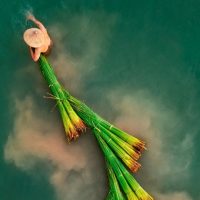Compass Travel Vietnam
From empty hand to mushroom farm owner 2,000 m2
HA TINH – On the first day of starting a business, no one bought the mushrooms. Mr. Le Trong Hai was advised by his wife to change his job but refused and was angry for 7 years.
Until now, having owned a 2,000 m2 mushroom farm system and spacious living facilities, Mr. Hai, 53 years old, residing in Binh An commune, Loc Ha district, still remembers the days when he couldn’t sleep because of mushrooms.
Mr. Hai is married to Mrs. Nguyen Thi Nguyet and has three sons and a daughter. Husbands and wife work in the fields, raise livestock, and have to be frugal to feed their children. In 2005, when he joined farmers in Binh An commune to attend a training course on mushroom cultivation organized by the Ha Tinh Department of Science and Technology, Mr. Hai found it “interesting and strange” so he returned to build a 100 m2 house with makeshift bamboo pictures and bought it. 3,000 oyster mushroom embryos for trial planting “for fun”.
After 6 months, the fungus proliferates continuously, does not spoil, and is sold to people as food. Excluding the amount of capital spent, Mr. Hai made more than 10 million dongs (500$).

With initial success, Mr. Hai is happy to think this is an opportunity to help his family get out of poverty. In mid-2006, he borrowed money from relatives and banks to build brick kilns, renew the factory system, buy thousands of embryos of oyster mushrooms, reishi, and wood ear mushrooms to do big business. About 10 households in the village also shared the same idea with Mr. Hai, renovating some areas of land in the mushroom-growing campus.
Initially, Mr. Hai took embryos from the District Department of Agriculture, but later found that this was dependent, so he went directly to Hanoi to find mushroom-growing facilities to learn how to propagate manually. Inexperienced so the embryo is damaged a lot. In addition, Mr. Hai also faced difficulties in the market, the mushrooms produced could not be sold. Customers only buy to try a few meals, then don’t care.
In the first two years, Mr. Hai’s small establishment only collected 20-30 million dong from selling mushrooms, minus all expenses, the capital was negative. Ms. Nguyet was worried and advised her husband to change jobs, but her husband encouraged her: “You can rest assured that you have to persevere in getting rid of termites or giving them as gifts and training for people to get used to mushrooms, because they don’t understand this species at the moment.” . Mrs. Nguyet replied: “Where is the money to do this, the rice is not enough to sell, the money is borrowed from the bank”. Unable to shake her husband’s intentions, Ms. Nguyet was angry, declaring “Ignore him, do whatever you want, don’t let mother and daughter suffer and lack”.
In the period 2006-2007, about a dozen households in the village who participated in the experiment to grow mushrooms also lost tens of millions of dong, had to clean up the factory because of wrong technique, and deadlocked output. Mr. Hai at this time mainly grows oyster mushrooms, every day there are products, but there are also few customers.
Every day, he carries 30 kg of oyster mushrooms to sell, but only consumes 2 kg. Meeting the vegetable seller, he left his phone number and sent them a few bags of mushrooms to sell on his behalf. If the transaction is possible, take the money, give them the commission, if no one buys it, give it to the customer to practice eating and getting acquainted with the mushroom. “However, at that time, no one called back. Twice a month, I went to Hanoi to find a place to sell products. Many days I brought the leftover mushrooms to dry, then imported cheap prices for bakeries and vegetarian restaurants.” , Mr. Hai said.

After persevering for 4 years with many sleepless nights, many restaurants and eateries inside and outside the province began to buy mushrooms at Mr. Hai’s premises. However, bad luck struck again. In 2010, a storm made landfall in the Loc Ha district, causing widespread rain and flooding. Mr. Hai’s 300 m2 mushroom factory was knocked down by the wind, and 10,000 mushroom embryos were crushed. The family lost more than 100 million dongs (4,000$).
Witnessing the ruined factory, and rotting mushrooms, Ms. Nguyet became even angrier with her husband. But Mr. Hai still quietly borrowed money to rebuild the facility, with the determination to lose one glue and another. “I have faith that mushrooms will grow in the future, and my choice is right, even though the journey to start a business is too difficult,” said Mr. Hai.
Mushroom making takes place almost all year round. From the beginning of autumn to the end of spring, Mr. Hai grows oyster mushrooms, reishi, and wood ear. During the three months of summer, when he cleans up the factory to prepare for the new crop, he will use a small amount of vacant land to make straw mushrooms. To create mushroom embryos, high ruu sawdust and straw are required. Next is the process of incubating sawdust, straw with lime water, stirring all the embryos, putting them in the sterilization oven…
Mr. Hai’s establishment mainly grows oyster mushrooms and Ganoderma lucidum. With oyster mushrooms, after a month there will be products, almost every day there are mushrooms growing on the embryo. With Ganoderma is 4 months, a crop of about 3 litters for sale. Among the species, Ganoderma requires the most complicated technique, it is necessary to keep the humidity 28-32 degrees Celsius, otherwise it will spoil. If the weather is dry, the mushrooms will rot if they are not done properly.

From 2011 onwards, all the mushrooms produced were purchased by partners, Mr. Hai ran out of losses, paid off many debts, enough to support his family and raise his children to school. In 2015, when she saw Mr. Hai set up a mushroom growing cooperative and expanded the factory system, Ms. Nguyet supported, after about 7 years, opposed to her husband growing mushrooms.
“Sometimes I repeat this, she just laughs. My wife confided that everything was only for the family, afraid that her husband would work hard because of the fungus, if he was not lucky in business, his children would unfinished school. practice,” Hai recalled.
Hai and his wife’s four children all went to university, now three of them are married. Particularly, after graduating from the Vietnam Agricultural Academy, he returned to his hometown to support his father in developing a mushroom farm.
Mushroom prices increase over time, up to now, a kilogram of oyster mushrooms costs 30,000-35,000 VND, Ganoderma lucidum 1-1.2 million VND, and wood ear mushrooms 120,000 VND. Oyster mushrooms, wood ear mushrooms, and straw mushrooms are often sold as food. Ganoderma lucidum is imported for partners to soak in alcohol, grind flour to eat, help regulate blood pressure, and prevent diseases. (1$=25,000 VND)
Every year Mr. Hai’s cooperative produces 30-35 tons of oyster mushrooms, 4-5 quintals of reishi mushrooms, and 10 tons of wood ear. In addition to selling products, the facility also produces about 600,000 mushroom embryos, bringing in the price of 9,000 VND per embryo. The harvested embryos will be sold to households growing melons as microbiological fertilizers, costing two bags of 1,000 VND.
Mr. Hai shared about mushroom farming. Video: Duc Hung
The total annual revenue of the establishment is about 2 billion VND, after deducting all costs of labor, raw materials and care, the profit is about half a billion VND. In the production process, in 2019-2020, the revenue is not positive, due to the influence of Covid-19, and social isolation, Mr. Hai calculated. During the mushroom growing and harvesting season, the cooperative hires more than 10 seasonal workers, paying nearly 5 million VND per month.
From empty-handed, temporary houses are shackled, until now, Mr. Hai has built a spacious new house, bought many expensive living items, has a stable economy, has accumulated. Mr. Hai is planning to ask the government for more land to expand the facility, in addition to creating more jobs for people in the area, he also aims to pass on his mushroom-growing experience to those who want to start a business.
Mr. Nguyen Minh Hien, Chairman of the Farmers’ Association of Binh An Commune, evaluated Mr. Hai’s perseverance, always having the will to advance. “With many other members, if they lose, they will switch to other jobs. But Mr. Hai doesn’t do that. When he fails because the fungus still sticks, he finds shortcomings to overcome and creates new values for his products. agricultural production in the locality,” said Mr. Hien.
From empty hand to mushroom farm owner 2,000 m2
vinlove.
Source: vinlove









